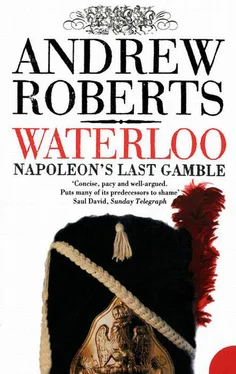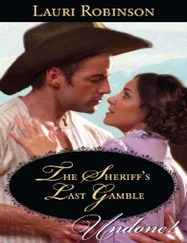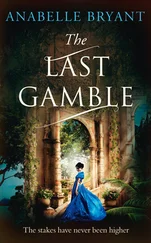Of course Waterloo did not spell the end of the entire Bonapartist epic – that did not take place until Napoleon’s great-nephew the Prince Imperial was speared to death by Zulu assegais in 1879 – but it did condemn the Emperor Napoleon I to ignominious exile and a subsequent early death on the Atlantic rock of St Helena. It also finally brought to an end no fewer than twenty-three almost unbroken years of French Revolutionary and subsequently Napoleonic Wars, and ushered in a period of peace in Europe that was to last – with a few short if sharp exceptions – for a century, until those self-same Low Countries fields were churned up once more with the mud and blood consequent upon similar hegemonic European ambitions.
What Lord Byron disapprovingly called ‘the crowning carnage, Waterloo’, and Alfred, Lord Tennyson, with more reverence in his panegyric poem to Wellington, ‘that world-earthquake, Waterloo!’, brought the eighteenth century to a full stop, or rather to a final exclamation mark. Despite taking place one-seventh of the way into the calendar nineteenth century, Waterloo was nonetheless essentially an eighteenth-century phenomenon. Historians sometimes write of ‘the long’ eighteenth century, a period starting with the English revolution of 1688 and ending in 1815, and it is right to see Waterloo as the end of both a geopolitical and a military era.
Ghastly as the carnage at Waterloo undoubtedly was, thenceforth wars were to be fought with the infinitely more ghastly methods of trenches (the Crimea), barbed wire, railways and machine-guns (the American Civil War), directed starvation (the Franco-Prussian War), concentration camps (the Boer War), and mustard gas and aerial bombardment (the First World War). 1By the time of the Great War, chivalry was effectively dead as an element of war-making.
By contrast with today, when an enemy head of state constitutes a legitimate military target, Wellington refused an artillery officer under his command permission to fire his battery at Napoleon. The gorgeously-coloured uniforms worn in the Napoleonic Wars were replaced, by the time of the Boer War, with khaki and subsequently camouflaged uniforms, as troops sought to blend in with the surrounding country rather than bedazzle their enemies. For all that Waterloo was, like all battles, essentially about bringing death and maiming to the enemy, there was also a tangible spirit of élan , esprit , éclat and – at least initially – aesthetic beauty to the scene.
There was also plenty of chivalry shown on both sides at Waterloo; witness the reaction of the British infantry during the great French cavalry attack when, according to Ensign Howell Rees Gronow of the 1st Foot Guards:
Among the fallen we perceived the gallant colonel of the hussars lying under his horse, which had been killed. All of a sudden two riflemen of the Brunswickers left their battalion, and after taking from their helpless victim his purse, watch, and other articles of value, they deliberately put the colonel’s pistols to the poor fellow’s head, and blew out his brains. ‘Shame!’ ‘Shame!’ was heard from our ranks, and a feeling of indignation ran through the whole line. 2
Captain (later Lieutenant-Colonel) William Tomkinson of the 16th Light Dragoons similarly recorded the occasion when ‘An officer of cuirassiers rode close to one of our squares with a detachment of men. He saw he had no chance of success, and by himself alone rode full gallop against the square, was shot and killed. Our men and officers regretted his fate.’ 3
The generation after Waterloo saw, in the title of the great work of the distinguished historian Paul Johnson, The Birth of the Modern , and in one sense the battle was the midwife to this great act of world-historical obstetrics. With Napoleonic ambitions no longer subjecting Europe to campaign after campaign, Mankind could finally look ahead to a period of peace and progress.
Yet Napoleon himself had also been, at least in the early days of his rule, a great force for social and political modernisation. His absolute power had of course corrupted his regime absolutely, but before that happened he had swept away much of the obscurantism and backwardness of many of Europe’s anciens régimes . Tyrant that he undeniably became, responsible for the deaths of hundreds of thousands though he undoubtedly was, a standing obstacle to peace as he certainly turned into, nonetheless Napoleon was not all bad, and certainly nothing like the ideological totalitarian monsters who followed him.
The battle that brought the Napoleonic juggernaut to its final halt and shattering collapse is worthy of all the exhaustive study and minute analysis that has been devoted to it. As one of its earliest and most perceptive chroniclers, General Sir James Shaw Kennedy (who had fought in the campaign), wrote in the peroration of his classic Notes on the Battle of Waterloo:
There can be no doubt that, so long as history is read, the battle of Waterloo will be much and eagerly discussed; and that, so long as the art of war is studied, its great features, and most important details, will form subjects of anxious inquiry and consideration by military men. 4
And not just by military men. The enduring fascination of Waterloo is not just its sheer size, or its historical results, or the fact that Napoleon and Wellington had never faced each other across a battlefield before and never would again, or the strategy and tactics employed, or the tales of valour, or the famous and colourful individuals and regiments involved, or even the fact that it was ‘a close run thing’; it is the unique combination of all those factors, and of so many more besides.
Конец ознакомительного фрагмента.
Текст предоставлен ООО «ЛитРес».
Прочитайте эту книгу целиком, купив полную легальную версию на ЛитРес.
Безопасно оплатить книгу можно банковской картой Visa, MasterCard, Maestro, со счета мобильного телефона, с платежного терминала, в салоне МТС или Связной, через PayPal, WebMoney, Яндекс.Деньги, QIWI Кошелек, бонусными картами или другим удобным Вам способом.












